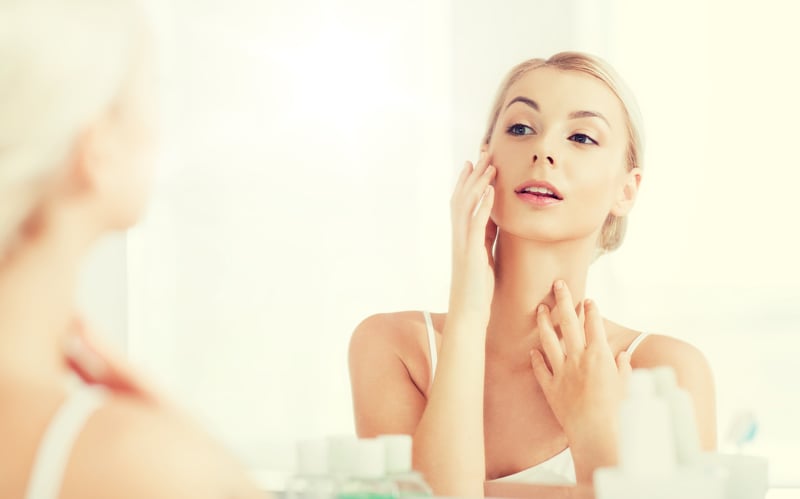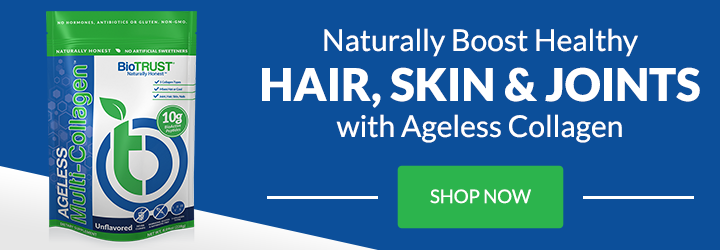How to Get Glowing Skin for Summer (6 Easy Tips)

Your skin is vitally important. Not only is it the body’s most visible organ, it holds in bodily fluids so we don’t become dehydrated. It protects us from harmful pollutants, microbes, and toxins to prevent illness. When exposed to the sun, it produces vitamin D, an essential vitamin that promotes calcium absorption and is necessary for healthy teeth and bones among other key benefits. Our skin gives us direct information about the world around us—letting us know when it’s hot or cold, if we get hurt, and when there’s pressure acting on our bodies. And, it helps our bodies maintain a constant temperature.
The skin is quite complex, and it is made up of several layers of tissue, collagen protein, hair follicles, and sweat glands. The three layers of tissues include: 1) the epidermis, the paper-thin outer layer that flakes off dead cells and contains melanin, which gives skin its color; 2) the dermis, found in the middle, which contains blood vessels, nerves, hair follicles, and sweat and oil glands and is made up of collagen and elastic fibers; and 3) the subcutaneous layer, which is made up of mostly fat along with blood vessels and nerves and is needed to insulate our bodies from extremes in temperatures and to cushion us against injuries.
As the most visible organ, our skin also reveals how healthy we are and acts as a billboard to give people an indication of how old we are. So, if we want to keep looking healthy and more youthful, skin care needs to be a priority. Otherwise, when neglected, we can be rewarded with crow’s feet, fine lines, wrinkles, age spots, bags under your eyes, and thin, crepey, saggy skin that is far from glowing or radiant.
Now that we know how important our skin is, it’s time to kick up skincare a notch to enjoy great glowing skin for summer.
How to Get Glowing Skin: Six Steps for Great Summer Skin
Not surprisingly, lifestyle factors can have a major effect on the skin. They can help us look younger (when optimized) or older (if neglected). Since you’re reading this article, let’s assume you wouldn’t mind looking younger and enjoying greater skin health. Here are 6 simple steps for glowing summer skin to get you started.
#1 Stay Hydrated
We’ve said it before, and we’ll likely say it again and again and again, water is the most important thing we can consume, as our bodies are made up of 55 to 75% water. We cannot survive without it. Drinking enough water every day is key to good health as it’s necessary for digestion, circulation, and absorption of nutrients. You may not realize, however, that water goes to the other organs of the body before it’s delivered to the skin, so keeping it topped off is critical to the look and feel of glowing skin.
When your skin doesn’t have enough water, it dries out and becomes flaky and tight. It also leads to premature wrinkles. Since we lose water daily, we need to ensure we’re drinking enough to replace it, especially when we sweat or when the weather gets warmer. Hello summer!
The standard eight glasses of water per day recommendation is a good start, but requirements can vary due to your size, activity levels, climate, and more. So, a better recommendation may be 1 liter per 50 pounds of bodyweight per day. (This would equate to about 3 liters/95 ounces per day for a 150-pound person.) To keep an eye on your hydration, one of the easiest tools is to watch your urine—you should strive for a light yellow or almost clear color. If it’s dark yellow, you really need to add more fluids, especially fresh, clean water. (Also worth noting, however, is that sometimes vitamins can make your urine a brighter yellow even when you are hydrated.)
#2 Eat a Healthy Diet
If you want your summer skin to glow from within, the best thing you can do is provide it with nourishing antioxidants, key amino acids, and essential fats. This starts with eating a healthful diet full of nutrient-rich vegetables and fruits, which are abundant in vitamins, minerals, and antioxidants that may help diminish cell damage and prolong a more glowing, summer skin appearance.
Foods rich in omega-3 essential fatty acids, particularly fatty fish (such as salmon and sardines), nuts (especially walnuts), and seeds (like chia and flax) are also especially vital to younger, glowing skin. One study, for example, published in the American Journal of Clinical Nutrition revealed that women who ate more omega-3s benefited with fewer wrinkles and better skin moisture.
#3 Exercise Regularly
There’s a reason exercise has been called the true “fountain of youth.” It doesn’t just prevent our muscles from shrinking and midsections from growing, it can also transform us at the skin-deep level. Get this, exercise slows cellular aging. Plus, exercise increases circulation, which helps keep the skin looking vibrant and glowing by carrying oxygen and nutrients into all our cells, including those in the skin. It also helps get rid of cellular debris, and exercise can generate healthy levels of free radicals that have cell-protective and anti-aging effects.
Choose movements you enjoy and want to continue to do, as consistency is most important. And do your best to explore a wide variety of movements. Try dancing, yoga, weight training, walking, jogging, gardening, sports, CrossFit, bike riding, and more to help your body age more gracefully inside and out.
#4 Rest and Recover
How does your skin look after a night (or more) of tossing and turning (or staying up late binge watching your favorite series)? Not good, right? There’s no doubt that sleep is vital to healthy glowing skin. For example, poor sleep can increase stress hormones, increase inflammation, and even increase acne, sensitivity, allergic reactions, and other skin conditions. That lack of sleep can also increase the breakdown of collagen and hyaluronic acid, making your skin less resilient and leading to deeper, more noticeable wrinkles. It also leads to puffy eyes and darker circles under your eyes. Quite simply, a lack of sleep equals faster, more noticeable aging. Not good!
Good sleep, on the other hand, can help improve skin conditions, help the skin recover moisture, and help you look and feel younger. New collagen is created as we sleep to help prevent skin sagging and allow our skin to look fuller and less wrinkly. If you want that glowing summer skin, good sleep increases blood flow to the skin, so you wake up with a healthier, more alive, rosier complexion. When we’re tired, we’re also likely to frown more often, which can make us look older and result in the formation of expression lines.
So, ensure you’re getting 7 to 9 quality hours of sleep each night. You may notice an improvement in the way your skin looks within just one night and with more dramatic improvements in a few weeks.
#5 Avoid Harsh Chemicals and Toxins
As the most visible organ as well as the one with the greatest amount of contact with the outside world, skin is also one of the most vulnerable to toxins from pollution to cigarette smoke (even secondhand) to overexposure to the sun to laundry detergents to toxins we may be unknowingly slathering on with sunscreens, lotions, and skin “care” products. Some of the surprising toxins and irritants you can find in various beauty, skin, and personal care products include:
- Benzophenone
- Formaldehyde
- Fragrances or fragrance blends
- PABA
- Parabens
- Phthalates
- Propylene glycol
- Sulfates like sodium lauryl sulfate or sodium laureth sulfate
- Synthetic colors or dyes
- Toluene
- Triclosan
Just as you read your food labels to avoid unhealthy additives and ingredients, take the time to read through the labels on products you use on your skin. And choose more natural products with fewer ingredients. The Environmental Working Group (EWG) has created a fantastic resource (the Skin Deep® Cosmetics Database) that provides a list of some of the safest products for your skin, hair, and nails. Choose wisely and your glowing skin will thank you for it.
#6 Hydrate and Protect Your Skin Surface
Remember the first step on hydration where we learned that water goes to all of your other organs before it reaches the skin? That’s one reason it’s important to hydrate from both within and from the surface. The latter starts with a healthy skincare routine that includes cleansing with a non-drying soap or cream cleanser. Gently apply the cleanser with just the tips of your fingers — and don’t scrub. Then, rinse with plenty of warm (not hot) water and pat (don’t rub) dry. You may also choose to exfoliate the skin to help remove dry, dead cells, but don’t do this more than once as week as that can dry the skin even more.
If you wear makeup, remember to remove it before going to bed as sleeping with makeup can clog pores and increase acne.
Then, remember to moisturize, moisturize, moisturize! Key ingredients to look for to help your skin hold onto moisture include:
- Hyaluronic acid to help maximize collagen levels to keep skin elastic and supple
- Vitamin C, which is vital for its ability to support collagen synthesis and help protect against UV damage
- Vitamin E, which helps fight off free radicals and the damage and aging they can cause to the skin
- Plant-derived squalane oil for its extreme yet lightweight moisturizing properties, which smooths into the skin immediately.
All skin types, both young and old, dry and oily, need moisturizer every day. If you’re prone to breakouts, choose lightweight options.
Then, add your sunscreen, especially before heading out into the sun, even if it’s cloudy. To prevent overexposure to toxins, avoid those with an SPF over 50, as well as those that contain retinyl palmitate or oxybenzones. If you will be getting a lot of sun exposure, go with an SPF of 30. Zinc as well as 3% avobenzone appear to be some of the safest ingredients. Use sunscreen liberally and apply it often, especially if the sun is intense or you’re around water.
The Key to Glowing Skin for Summer: A Recap
If you want youthful, radiant, glowing skin for summer, it’s important to keep it in tiptop condition—not just for your overall appearance but so it can perform its many essential tasks. Following the six simple steps above will help you do just that.







